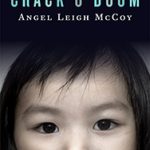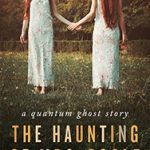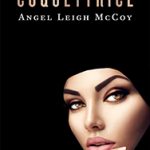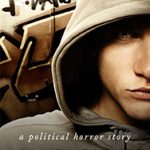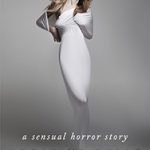Bruce Taylor, aka Mr. Magic Realism, is one of Seattle’s landmarks, always seen wherever writers are gathering, dressed in his white suit and top hat. He’s a ray of light in an otherwise very rainy and dark city, drawing writers and other creatives to him. If you ever get the opportunity to converse with him, grab it. He’s a wise and complex man who takes his Magic Realism to heart.
In Night-Mantled: the Best of Wily Writers, volume 1, Bruce has a story entitled “The Prey.” It’s a moody horror piece about a man’s issues with his father, and it hooked me from the first paragraph.
I asked Bruce a few questions about himself, his writing, and his philosophy of life.
What made you become a writer?
I’ve always been a writer, probably since the day I was born. It was never a “conscious” choice. Both my parents were wanna-be writers, both talented; it wasn’t until my mother died that I ran across her poetry that she had written. My dad wrote but never did anything with it as far as “getting it out there,” though it turned out, many years after he died, I ran across a narrative he wrote of hiking up the middle fork of the Snoqualmie River in the 30’s–that’s where I discovered just what a fine writer he was.
Not allowing himself to really do something with his writing meant my father was very much threatened by me when I began to take myself seriously as a writer; he could not support me in my quest for my life’s purpose when he didn’t go for what his life purpose was: to be a writer. To say that this got a bit in my way of feeling safe and accepting my power as a writer would be something of an understatement (all this is the subject of the second book of the spiritual trilogy, Magic of Wild Places, which will be published May 28th, 2011–my birthday.
What kinds of stories (genre, style, topic, or etc.) do you prefer to write? Why?
I love writing magic realism. I grew up on the tales of H.G. Wells, Jules Verne, and Ray Bradbury; they showed me that I shared with them the power of imagination and that it was a wonderful and fun thing to have, to own. Later on, discovering literature–Sophocles, Homer, Steinbeck, Dostoevsky, Flaubert, Kafka, Robert Penn, Warren, etc., I learned the elegance of characterization, psychology, and the precision of language. With magic realism, I learned how to blend the techniques of that world view (the everyday on the same level playing field as the fantastic and fantasies/dreams and dream-like reality) with the iconic structure and props of science fiction to create a blending of the two forms which is demonstrated in what is being called (much to my delight) a “ground-breaking” anthology, Like Water for Quarks, coming out April 21st, 2011, at NorwesCon. Co-editor, Elton Elliott , former editor for Science Fiction Review, has referred to me as “THE transformative figure for science fiction”. Gotta say, I’m pretty blown away by that. All I was doing was having fun!
What was the most helpful advice someone ever gave you about writing?
After a very grueling start in a science fiction workshop many years ago, my confidence was sorely shaken. I turned in one story that was very much trashed. I took a book by Steinbeck, “Cannery Row”, wrote out the first three pages, long hand then, in the tone, cadence and structure, of Steinbeck, continued on in my own words and created a story. Turned it in the next day to 21 people in the workshop. 18 thought it sucked. Two thought it needed work. The remained person, Avram Davidson, former editor of the Magazine of Fantasy & Science Fiction, and superb wordsmith himself, looked at me for a long time and then said, “See me after class.”
Muchly grieved that I thought I had screwed up and was going to be asked to leave, I went up to Avram, and he looked at me with great kindness and said, “When I first saw your stuff, I wasn’t sure you could write. But this story is great. Here’s a cover letter for Ed Ferman at Fantasy and Science Fiction. I think he’ll like it.” Then he paused and finally said, “You write strange, off- beat stuff. A lot of people won’t get what you are doing. That’s ok. Just keep doing it.”
Best advice I ever had. Write what you love to write and write for yourself. Write what gives you joy, passion. Some people will never get what you are doing; but you’re not writing for them. You’re writing for the people who DO get what you are doing. Write what you love to write, write what you love to read.
What has been the most thrilling moment for you, so far, as a writer?
Holy catz! Where do I begin?
- Being asked to be writer in residence at Shakespeare & Company.
- Paris and doing a reading there, being filmed by NBC who “just happened to show up”?
- Getting in touch with Tamara Sellman, the editor of Margin: Exploring Modern Magical Realism (after seeing her ad in Poets and Writers) about having my website, Magic Realism Writers International Network be a collaborative effort with hers and then discovering–she lived two miles away from me? And then becoming consulting editor at Margin, and then Margin being contacted by the staff at the Oprah Winfrey show to be a resource for a show with Gabriel Garcia Marquez and his book, “One Hundred Years of Solitude”–that show aired to millions, world wide.
- Being asked to be president of the Seattle Free Lances, oldest writing group on the west coast, to discover I’m regarded as one of the top writers of Bizarro fiction,
- and now, being asked to co-edit a book, Like Water for Quarks which has some of the finest writers in the field (Greg Bear, Ray Bradbury, Ursula K. LeGuin, Brian Herbert, Tamara Sellman and many others) contributing work illustrating the blending of magic realist writing techniques with science fiction–
good lord!What can I say? Passion and love of what you are doing takes you to marvelous places, wonderful people and a sense that one is living a life–well lived.
What is your next big goal, as a writer, and how are you working toward it?
My next goal is to get the second book of my spiritual trilogy (the first one being, Mountains of the Night–we all have our “mountains of the night” and who we are meant to be means we identify them, “climb” them, and discover the stuff we are truly made of) out there. As mentioned, that one is Magic of Wild Places–the idea here being how you identify with someone who doesn’t want you to identify with them; a father who turned down the writing life dealing with a son, who, wanting to be just like daddy in terms of the writing energy, couldn’t handle the idea of his son succeeding where he, the father, failed.
Then to complete the final book this summer/autumn: Majesty of the World–after all is said and done, and when we arrive at that place where are issues are quiet and/or resolved to the best of our ability, we can then look around the world and see it as for the first time, new and wonderful and beautiful as it truly, truly is.
What’s the one thing you want people to know about your story in Night-Mantled?
“The unexamined life is not worth living.” Plato
What writing organizations do you belong to?
I was president of the Seattle Free Lances, 2007 to 2009. Before that, I was president of the now disbanded, Seattle Writers Association. I’m an active member of SFWA–Science Fiction/Fantasy Writers of America. I teach writing through the ArtsNow Program at Edmonds Community College.
What’s the area of expertise you bring to your writing?
I worked many years to support myself as a mental health therapist at Harborview Medical Center on the inpatient, psychiatric floor. I’m also a hypnotherapist and taught relaxation skills at Harborview and ended up being co-director of The Wellness Program there. What do you want to know about the human condition except that, no matter how “crazy” someone is, it all makes sense. Working in that environment taught me so much about the way people think and why people do the things they do, say the things they say. What better place for a writer to learn about people? It was like I was being paid to observe and since I didn’t have to worry about making a living by my writing, I could write anything I wanted. I ended up writing between 800 to 1,000 short stories from l972 to present.
What philosophy guides your writing and your living?
What I have learned is that the more I come to know, the less I know; the universe is infinite in terms of possibilities. Whenever I find I’m in a funk, it’s usually because I think I know what is going to happen hence I become a God in that I become omnipotent and know the future. When I find myself thinking this, as unconscious as it usually is, I get grounded again. Not knowing what life is truly all about–well, it’s really okay not knowing this. It is really a cause to explore, to wonder, to be in delight of being here, mortal mammals that we are, on this third planet around a star. A pity we spend so much time on fear of our mortality rather than being in wonder of the fact that–we didn’t have to be here at all. Life is cause for joy and celebration and reassuring each other that we really are all right and that we all are worthy of love, of loving, of being loved.
In regard to the writer’s journey, I address much of this in a book that I’m trying to get to doing a final draft of: Fiction Writing for Fun, Profit and Possible Jail Time. It tells you all you want to know about the journey of this writer, what it has taken, what a challenge it has been, but a challenge so worth taking for in writing, I found my power as a creative person, and as a human being.
Part of this journey has been greatly aided by a book, The Artist’s Way by Julia Cameron. Hands down, it is, as far as I’m concerned, the best book out there that talks about what it is to be an artist in a mercantile society. Absolutely necessary to have this book, a spiritual guide, if you will, to protect and foster one’s creativity and knowing that ALL creativity is valid. And grand. And is just our way of saying “Thanks” to a universe that, through its infinity time and patience, was creative enough to bring forth this star, these planets, this earth and eventually–you–and me.
Bruce Taylor, aka “Mr. Magic Realism,” writes magic realism (think TWILIGHT ZONE) as well as bizarro and surrealism. He currently has a magic realist novella (“13 Miles to Paradise”) in a collection (ALEMBICAL) along with works by Jay Lake, James Van Pelt and Ray Vukcevich. The book received a starred review in Publisher’s Weekly.
His other recent work, “Edward: Dancing on the Edge of Infinity,” (RedJack Books, introduction by Jay Lake) took eighteen years to get published. Bruce has his first of the “Kafka’s Uncle” series published by Afterbirth Books (Introduction by Brian Herbert) and has the other two (“Kafka’s Uncle: the Unfortunate Sequel and Other Insults to the Morally Perfect” and “Kafka’s Uncle: The Ghastly Prequel and Other Tales of Love and Pathos from the World’s Most Powerful, Third-World Banana Republic” out to various editors.
His book, Kafka’s Uncle and Other Strange Stories was nominated for the &NOW Award for Innovative Writing.
A new book has been released from Eraserhead Press, titled “Mr. Magic Realism”. “Stormworld”, co-authored with Brian Herbert, is imminent. Bruce also is working on a “spiritual trilogy”, the first one, “Mountains of the NIght” was recently released, with the sequel, “Magic of Wild Places,” to be released soon.
When not writing, Bruce teaches writing at Edmonds Community College and is a hypnotherapist.
He tries to find time to sleep, backpack, pet his cat Purrrrrrrzac, and admire the smashing view of Mt. Rainier from his writing loft.
- Read his wily story, “The Prey.”
- Visit Bruce’s website.






